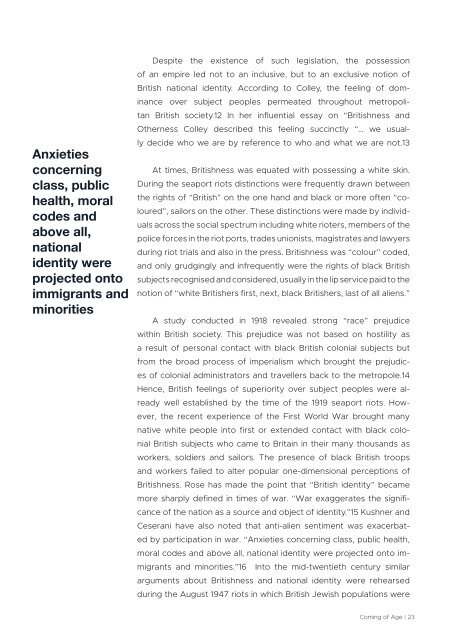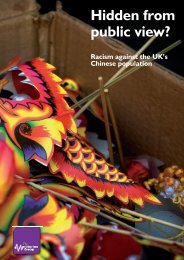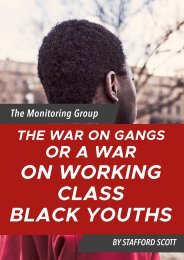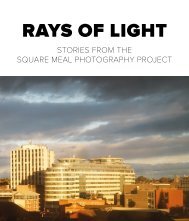Coming of Age : 1976 and the Road to Anti-Racism
Coming of Age : 1976 and the Road to Anti-Racism by Jagdish Patel and Suresh Grover
Coming of Age : 1976 and the Road to Anti-Racism
by Jagdish Patel and Suresh Grover
You also want an ePaper? Increase the reach of your titles
YUMPU automatically turns print PDFs into web optimized ePapers that Google loves.
Anxieties<br />
concerning<br />
class, public<br />
health, moral<br />
codes <strong>and</strong><br />
above all,<br />
national<br />
identity were<br />
projected on<strong>to</strong><br />
immigrants <strong>and</strong><br />
minorities<br />
Despite <strong>the</strong> existence <strong>of</strong> such legislation, <strong>the</strong> possession<br />
<strong>of</strong> an empire led not <strong>to</strong> an inclusive, but <strong>to</strong> an exclusive notion <strong>of</strong><br />
British national identity. According <strong>to</strong> Colley, <strong>the</strong> feeling <strong>of</strong> dominance<br />
over subject peoples permeated throughout metropolitan<br />
British society.12 In her influential essay on “Britishness <strong>and</strong><br />
O<strong>the</strong>rness Colley described this feeling succinctly “… we usually<br />
decide who we are by reference <strong>to</strong> who <strong>and</strong> what we are not.13<br />
At times, Britishness was equated with possessing a white skin.<br />
During <strong>the</strong> seaport riots distinctions were frequently drawn between<br />
<strong>the</strong> rights <strong>of</strong> “British” on <strong>the</strong> one h<strong>and</strong> <strong>and</strong> black or more <strong>of</strong>ten “coloured”,<br />
sailors on <strong>the</strong> o<strong>the</strong>r. These distinctions were made by individuals<br />
across <strong>the</strong> social spectrum including white rioters, members <strong>of</strong> <strong>the</strong><br />
police forces in <strong>the</strong> riot ports, trades unionists, magistrates <strong>and</strong> lawyers<br />
during riot trials <strong>and</strong> also in <strong>the</strong> press. Britishness was “colour” coded,<br />
<strong>and</strong> only grudgingly <strong>and</strong> infrequently were <strong>the</strong> rights <strong>of</strong> black British<br />
subjects recognised <strong>and</strong> considered, usually in <strong>the</strong> lip service paid <strong>to</strong> <strong>the</strong><br />
notion <strong>of</strong> “white Britishers first, next, black Britishers, last <strong>of</strong> all aliens.”<br />
A study conducted in 1918 revealed strong “race” prejudice<br />
within British society. This prejudice was not based on hostility as<br />
a result <strong>of</strong> personal contact with black British colonial subjects but<br />
from <strong>the</strong> broad process <strong>of</strong> imperialism which brought <strong>the</strong> prejudices<br />
<strong>of</strong> colonial administra<strong>to</strong>rs <strong>and</strong> travellers back <strong>to</strong> <strong>the</strong> metropole.14<br />
Hence, British feelings <strong>of</strong> superiority over subject peoples were already<br />
well established by <strong>the</strong> time <strong>of</strong> <strong>the</strong> 1919 seaport riots. However,<br />
<strong>the</strong> recent experience <strong>of</strong> <strong>the</strong> First World War brought many<br />
native white people in<strong>to</strong> first or extended contact with black colonial<br />
British subjects who came <strong>to</strong> Britain in <strong>the</strong>ir many thous<strong>and</strong>s as<br />
workers, soldiers <strong>and</strong> sailors. The presence <strong>of</strong> black British troops<br />
<strong>and</strong> workers failed <strong>to</strong> alter popular one-dimensional perceptions <strong>of</strong><br />
Britishness. Rose has made <strong>the</strong> point that “British identity” became<br />
more sharply defined in times <strong>of</strong> war. “War exaggerates <strong>the</strong> significance<br />
<strong>of</strong> <strong>the</strong> nation as a source <strong>and</strong> object <strong>of</strong> identity.”15 Kushner <strong>and</strong><br />
Ceserani have also noted that anti-alien sentiment was exacerbated<br />
by participation in war. “Anxieties concerning class, public health,<br />
moral codes <strong>and</strong> above all, national identity were projected on<strong>to</strong> immigrants<br />
<strong>and</strong> minorities.”16 In<strong>to</strong> <strong>the</strong> mid-twentieth century similar<br />
arguments about Britishness <strong>and</strong> national identity were rehearsed<br />
during <strong>the</strong> August 1947 riots in which British Jewish populations were<br />
<strong>Coming</strong> <strong>of</strong> <strong>Age</strong> | 23<br />
<strong>Coming</strong> <strong>of</strong> <strong>Age</strong> Final version 16.10.indd 23 17/10/2017 12:06







